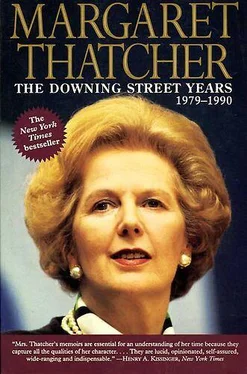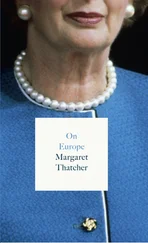Margaret Thatcher - The Downing Street Years, 1979-1990
Здесь есть возможность читать онлайн «Margaret Thatcher - The Downing Street Years, 1979-1990» весь текст электронной книги совершенно бесплатно (целиком полную версию без сокращений). В некоторых случаях можно слушать аудио, скачать через торрент в формате fb2 и присутствует краткое содержание. Город: New York, Год выпуска: 2010, ISBN: 2010, Издательство: HarperCollins, Жанр: Биографии и Мемуары, на английском языке. Описание произведения, (предисловие) а так же отзывы посетителей доступны на портале библиотеки ЛибКат.
- Название:The Downing Street Years, 1979-1990
- Автор:
- Издательство:HarperCollins
- Жанр:
- Год:2010
- Город:New York
- ISBN:978-0-062-02910-2
- Рейтинг книги:3 / 5. Голосов: 1
-
Избранное:Добавить в избранное
- Отзывы:
-
Ваша оценка:
- 60
- 1
- 2
- 3
- 4
- 5
The Downing Street Years, 1979-1990: краткое содержание, описание и аннотация
Предлагаем к чтению аннотацию, описание, краткое содержание или предисловие (зависит от того, что написал сам автор книги «The Downing Street Years, 1979-1990»). Если вы не нашли необходимую информацию о книге — напишите в комментариях, мы постараемся отыскать её.
[Best viewed with CoolReader.]
The Downing Street Years, 1979-1990 — читать онлайн бесплатно полную книгу (весь текст) целиком
Ниже представлен текст книги, разбитый по страницам. Система сохранения места последней прочитанной страницы, позволяет с удобством читать онлайн бесплатно книгу «The Downing Street Years, 1979-1990», без необходимости каждый раз заново искать на чём Вы остановились. Поставьте закладку, и сможете в любой момент перейти на страницу, на которой закончили чтение.
Интервал:
Закладка:
With the election of Attlee’s Labour Government, however, there began a sustained attempt, which lasted over thirty years, to halt this relative decline and kick-start a resurgence along lines which — whether we call them socialist, social democrat, statist or merely Butskellite [1] A political term dating from the early 1950s, denoting a consensus politician combining the moderate Conservatism of R. A. Butler with the moderate socialism of Hugh Gaitskell.
— represented a centralizing, managerial, bureaucratic, interventionist style of government. Already large and unwieldy after its expansion in two world wars, the British Government very soon jammed a finger in every pie. It levied high rates of tax on work, enterprise, consumption, and wealth transfer. It planned development at every level — urban, rural, industrial and scientific. It managed the economy, macro-economically by Keynesian methods of fiscal manipulation, micro-economically by granting regional and industrial subsidies on a variety of criteria. It nationalized industries, either directly by taking ownership, or indirectly by using its powers of regulation to constrain the decisions of private management in the direction the Government wanted. (As Arthur Shenfield put it, the difference between the public and private sectors was that the private sector was controlled by government, and the public sector wasn’t controlled by anyone.) It made available various forms of welfare for a wide range of contingencies — poverty, unemployment, large families, old age, misfortune, ill-health, family quarrels — generally on a universal basis. And when some people preferred to rely on their own resources or on the assistance of family and friends, the Government would run advertising campaigns to persuade people of the virtues of dependence.
The rationale for such a comprehensive set of interventions was, to quote the former Labour Cabinet minister, Douglas Jay, that ‘the gentleman in Whitehall really does know better what is good for the people than the people know themselves.’ A disinterested civil service, with access to the best and latest information, was better able to foresee economic eventualities and to propose responses to them than were the blind forces of the so-called ‘free market’.
Such a philosophy was explicitly advocated by the Labour Party. It gloried in planning, regulation, controls and subsidies. It had a vision of the future: Britain as a democratic socialist society, third way between east European collectivism and American capitalism. And there was a rough consistency between its principles and its policies — both tending towards the expansion of government — even if the pace of that change was not fast enough for its own Left.
The Tory Party was more ambivalent. At the level of principle, rhetorically and in Opposition, it opposed these doctrines and preached the gospel of free enterprise with very little qualification. Almost every post-war Tory victory had been won on slogans such as ‘Britain Strong and Free’ or ‘Set the People Free’. But in the fine print of policy, and especially in government, the Tory Party merely pitched camp in the long march to the left. It never tried seriously to reverse it. Privatization? The Carlisle State Pubs were sold off. Taxation? Regulation? Subsidies? If these were cut down at the start of a Tory government, they gradually crept up again as its life ebbed away. The welfare state? We boasted of spending more money than Labour, not of restoring people to independence and self-reliance. The result of this style of accommodationist politics, as my colleague Keith Joseph complained, was that post-war politics became a ‘socialist ratchet’ — Labour moved Britain towards more statism; the Tories stood pat; and the next Labour Government moved the country a little further left. The Tories loosened the corset of socialism; they never removed it.
Indeed, Keith’s formulation may have been too kind. After a reforming start, Ted Heath’s Government, in which we both served, proposed and almost implemented the most radical form of socialism ever contemplated by an elected British Government. It offered state control of prices and dividends, and the joint oversight of economic policy by a tripartite body representing the Trades Union Congress, the Confederation of British Industry and the Government, in return for trade union acquiescence in an incomes policy. We were saved from this abomination by the conservatism and suspicion of the TUC which perhaps could not believe that their ‘class enemy’ was prepared to surrender without a fight.
No theory of government was ever given a fairer test or a more prolonged experiment in a democratic country than democratic socialism received in Britain. Yet it was a miserable failure in every respect. Far from reversing the slow relative decline of Britain vis-à-vis its main industrial competitors, it accelerated it. We fell further behind them, until by 1979 we were widely dismissed as ‘the sick man of Europe’. The relative worsening of our economic position was disguised by the rising affluence of the West as a whole. We, among others, could hardly fail to benefit from the long economic expansion of the post-war western world led by the United States. But if we never had it so good, others — like Germany, France, Italy, Denmark — increasingly had it better. And, as the 1970s wore grimly on, we began to fail in absolute as well as relative terms.
Injections of monetary demand, which in the 1950s had produced a rise in real production and a fall in unemployment before causing a modest rise in prices, now went directly into high rates of inflation without so much as a blip on the charts for production and unemployment. State subsidies and direction of investment achieved progressively more inefficient industries and ever lower returns on capital. Laws giving protective immunity to the trade unions at the turn of the century were now abused to protect restrictive practices and overmanning, to underpin strikes, and to coerce workers into joining unions and participating in industrial action against their better judgement. Welfare benefits, distributed with little or no consideration of their effects on behaviour, encouraged illegitimacy, facilitated the breakdown of families, and replaced incentives favouring work and self-reliance with perverse encouragement for idleness and cheating. The final illusion — that state intervention would promote social harmony and solidarity or, in Tory language, ‘One Nation’ — collapsed in the ‘winter of discontent’ when the dead went unburied, critically ill patients were turned away from hospitals by pickets, and the prevailing social mood was one of snarling envy and motiveless hostility. To cure the British disease with socialism was like trying to cure leukaemia with leeches.
Another approach was needed — and for international reasons as well as domestic ones. Britain’s weakened economic position meant that its international role was bound to be cramped and strained as well. Our most painful experience of the country’s reduced circumstances was the failure of the Suez expedition in 1956. This was the result of political and economic weakness rather than military failure, because the Government withdrew a victorious force from the Canal Zone in response to a ‘run on the pound’ encouraged by the US Government. Whatever the details of this defeat, however, it entered the British soul and distorted our perspective on Britain’s place in the world.
We developed what might be called the ‘Suez syndrome’: having previously exaggerated our power, we now exaggerated our impotence. Military and diplomatic successes such as the war in Borneo — which preserved the independence of former British colonies against Indonesian subversion, helped to topple the anti-western dictator, Sukarno, and thus altered the long-term balance of power in Asia in our interest — were either dismissed as trivial or ignored altogether. Defeats, which in reality were the results of avoidable misjudgement, such as the retreat from the Gulf in 1970, were held to be the inevitable consequences of British decline. And comic opera enterprises, such as Harold Wilson’s ‘invasion’ of Anguilla in March 1969 (for once, ‘police action’ seems the right term) were gleefully seized upon to illustrate the reality of reduced British power. The truth — that Britain was a middle-ranking power, given unusual influence by virtue of its historical distinction, skilled diplomacy and versatile military forces, but greatly weakened by economic decline — seemed too complex for sophisticated people to grasp. They were determined to think themselves much weaker and more contemptible than was in fact the case, and refused all comfort to the contrary.
Читать дальшеИнтервал:
Закладка:
Похожие книги на «The Downing Street Years, 1979-1990»
Представляем Вашему вниманию похожие книги на «The Downing Street Years, 1979-1990» списком для выбора. Мы отобрали схожую по названию и смыслу литературу в надежде предоставить читателям больше вариантов отыскать новые, интересные, ещё непрочитанные произведения.
Обсуждение, отзывы о книге «The Downing Street Years, 1979-1990» и просто собственные мнения читателей. Оставьте ваши комментарии, напишите, что Вы думаете о произведении, его смысле или главных героях. Укажите что конкретно понравилось, а что нет, и почему Вы так считаете.












